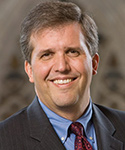In October of this year, the Nobel committee rewarded Dr. Robert Lefkowitz for solving a wicked problem.
For decades, biologists and chemists had struggled to understand the nature and function of G protein-coupled receptors, which are essential components of the cell membrane. They knew that these receptors were involved in the cell’s communication with the rest of the body, and that understanding them fully would open up exciting new research avenues.
But they also found it extremely difficult to understand how this process works. With so many chemical factors, on such a microscopic scale, how would you go about solving the mystery? Lefkowitz and his team discovered a strategy for finding the solution, and it won them the Nobel Prize in chemistry.
What it all boils down to, according to Lefkowitz, is a single word: chutzpah. Yiddish for audacity, “chutzpah” aptly describes his approach to research. “I’m probably working on the most challenging problems I’ve ever worked on,” he said in an interview with Duke Magazine. “I have no idea whether I can solve them.”
What he does have is a methodology to match his audacious approach to research: Think big, experiment, expect failure, learn from failure. Experiment again, fail again.
The willingness to experiment and fail didn’t come easy to Lefkowitz, however. As a young scientist at the National Institutes of Health (NIH), his first year was filled with nothing but failure, he said in the Duke interview. As one might expect, he despaired. “Now, for the first time in my life,” he said, “I didn’t know what the hell I was doing. … And I concluded, erroneously, that I had no talent for this at all.”
Yet after his second year at NIH, in which he fared much better, he began to reconceptualize failure. “What I subsequently came to realize is that a year’s failure is nothing -- nothing. I remember one prominent scientist telling me, ‘The difference between a really successful scientist and an average scientist is that for the average scientist, maybe 0.5 to 1 percent of his experiments work. For an absolutely fabulous scientist, it could be as high as 2 percent.’” Likewise, he began to re-imagine success: “Success is, in a very real sense, just the product of repeated failure.”
Not all wicked problems are like the scientific ones that make up Lefkowitz’s research, but all of them require his habits of experimentation and learning from failure.
After all, if wicked problems are distinguished from hard problems by their complexity and the way their character changes the more you work on them, there will be no single way to solve a wicked problem. Experimentation, then, is crucial to a process of discovering generative solutions; you have to be willing to test different strategies that address different aspects of the wicked problem.
In the attempt to solve a wicked problem such as poverty, for example, we can design experiments from different perspectives: What kind of effect would affordable housing for single mothers have? What about private school vouchers? Or we can design experiments from within a single perspective, but with differing contexts: Does the effect of private school vouchers depend upon class alone, or is there a significant racial component at play?
In gleaning insights as we develop such experiments, we are likely to discover new aspects of the wicked problem in question. Maybe the experiment on affordable housing revealed the importance of affordable transportation to and from work, or the voucher experiment revealed the social danger of extracting kids from their neighborhoods. None of these connections can be made without trying, even if many of them fail to deliver the results we had hoped.
One of the daunting challenges Christian institutional leaders face, though, is that we often lack sufficient resources to think we can afford to undertake experiments that might -- indeed, likely will -- fail.
And many of the foundations and donors who support our institutions pay lip service to the importance of “experiments” and “learning from failure,” even as their funding decisions seem structured to reward only unambiguous success. In resource-constrained environments, playing it safe with programs that seem to show progress, if only on a “tactical” rather than a “strategic” level, seems the wisest course, even if it only defers grappling with the deeper dimensions of wicked problems.
We can overcome this predicament by working with stakeholders, including funders, at the outset, carefully framing wicked problems and possible experiments -- and acknowledging that many of those experiments might fail. Hence, we will allocate our resources to multiple provisional experiments rather than any single grand design.
Failing with a grand design will be a grand failure; failing with multiple provisional experiments will make failure absorbable (and not all of those experiments will likely fail). Each experiment can grow out of the lessons learned from the previous one, transforming failure into an educational tool. The IDEO design firm has a motto that encourages people to “fail often to succeed sooner.”
Yet when solving a wicked problem, not all failure is good failure.
We must be careful, therefore, to distinguish between different types of failure. We Christians ought to have a rich vocabulary for doing so. Failure can result from culpable, sinful mistakes. Or failure can result from the unwillingness to take a risk on an intriguing hunch. These kinds of failures will hamper the problem-solving process and should be resisted.
But failure can also be the natural byproduct of an innovative experiment, and this kind of failure should be embraced and even encouraged. Indeed, when the practice of learning from experimental failure becomes a part of our institution’s DNA, we will be more capable of identifying wicked problems and discovering generative solutions.
Just look at Lefkowitz’s institutional attachments. Yes, he is the James B. Duke Professor of Biochemistry at Duke University. But he also works at the Howard Hughes Medical Institute (HHMI), a nonprofit medical research organization located in Maryland. HHMI’s “investigator” program, of which Lefkowitz is a part, urges its researchers “to take risks, to explore unproven avenues, and to embrace the unknown -- even if it means uncertainty or the chance of failure.”
In his book “Adapt: Why Success Always Starts with Failure,” economist Tim Harford contrasts this risk-taking approach with that of the more traditionally minded NIH. “The NIH’s expert-led, results-based, rational evaluation of projects,” he writes, “is a sensible way to produce a steady stream of high-quality, can’t-go-wrong scientific research.”
What it often fails to do, however, is fund those “revolutionary breakthrough” projects like Lefkowitz’s. Research has shown that the HHMI pattern of experimentation yields more failures over time -- and also more breakthrough successes.
To put the matter another way, NIH might be the world’s best solver of hard problems. But when it comes to wicked ones, we need institutions like HHMI, who embrace experimental risks and the inevitable failures that accompany them.
And we need Christian institutions and institutional leaders who are committed to Lefkowitz’s formula for discovering breakthrough, generative solutions: Think big, experiment, expect failure, learn from failure. Experiment again, fail again.


















